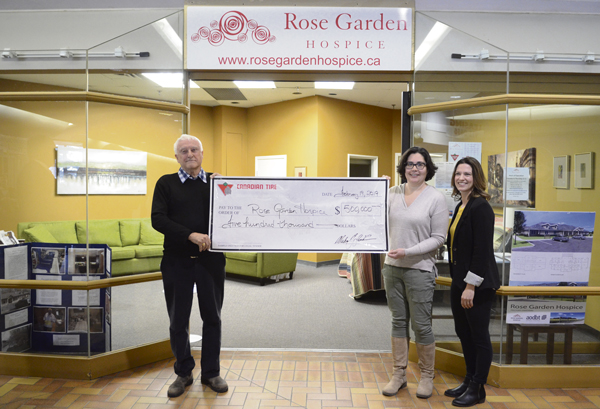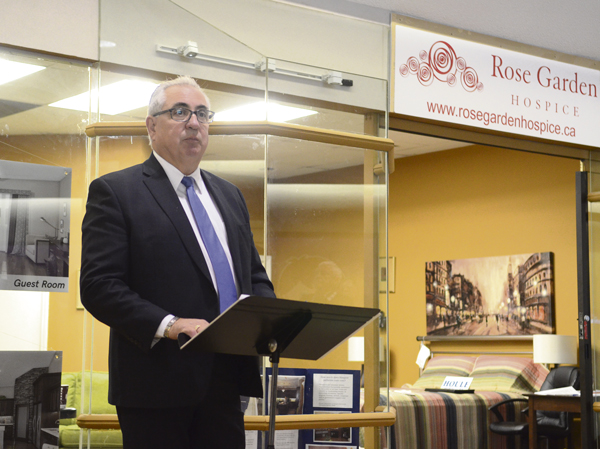
The campaign to build a hospice in Prince Albert got a major boost Tuesday morning, with a pair of announcements of significant contributions to the cause.
Sask. Party MLA and Minister Responsible for SGI Joe Hargrave went first, announcing that the province had agreed to provide up to $2 million a year in operating funds for the hospice beginning in 2021.
Then local philanthropist Malcolm Jenkins stepped up to the podium. He announced that he and Canadian Tire would be contributing $500,000 towards the capital costs of building the facility and furnishing it with equipment. With an additional $100,000 or so raised from other sources, and a $4 million total price tag, that leaves just $3.4 million to go.
“It’s a wonderful day. We couldn’t have asked for anything better,” said Marina Mitchell, chair of the Rose Garden Hospice Association.
“Our hope is we can fundraise this in, hopefully, the next six months, and can start building in the fall or early next spring.”
Mitchell has been involved since the start, ten years ago. Her mother, Rose, passed away in the hospital during her battle with cancer.
“We realized there has to be a better way for those final days with your family, and even after,” she said.
“That was really difficult for us, so we looked into what a hospice is … and got the ball rolling.”
Over the last ten years, the association has done a tone of research and visits. They’ve had the land donated and architectural plans drawn up. All that’s left to do is build it.
They’re hoping to raise the money from corporate and private donors, and through public fundraising events like radiothons or other events of that nature.
The finished hospice will have a non-denominational chapel for contemplation, prayer, quiet gatherings and celebrations. The facility will have ten beds in a 10,000 square foot building.
Operations will include expert care providers such as health practitioners, therapists, a social worker, spiritual care providers and others committed to personalizing and humanizing end of life care.
“It’s been a lot of work,” Mitchell said, “But it’s well worth it.”
Everyone involved in the announcement Tuesday had a personal story or inspiration for why they wanted to support the hospice. That includes Hargrave, who experienced first-hand the impacts of a hospice, in Prince George, BC, when his parents died.
“It’s very personal to me I’ve been lobbying since before I was elected, after being elected I continued to stress how important the hospice was to not only Prince Albert, but everywhere in this province,” he said.
“They take care of the patient, they take care of the family, they show the empathy that’s required. They have the time and the training to spend with the families and to spend with loved ones.”
Hargrave said the operating funding promised by the province would be ongoing and is based on what the estimated costs should be.
“That figure … will be sufficient for the next number of years,” he said.
It will be administered to the hospice through the Saskatchewan Health Authority.
Another theme that emerged Tuesday was how innovative a hospice would be not just for Prince Albert, but for all of Saskatchewan. There is no freestanding hospice in Saskatchewan, though there is some end-of-life care in hospital settings.

“I think in any community where there isn’t a palliative care service outside of what we provide in long-term care and in acuter care, having a hospice allows for that portion of people that are unable to die and home and don’t want to be in the hospital or don’t need to be in the hospital,” said Andrew McLetchie, the SHA vice president of integrated northern health.
“These are patients that won’t need to have the hospital’s acute environment to care for them. This … will ensure that they have the nursing support, the pharmacy support and any other needs addressed in that home-like environment.”
It could also free up some beds at the hospital, he added, which is an added benefit for the area.
None of this is news to Jenkins. He indicated that in England, hospices are the norm. There are more than 1,000 in the country, and more than 25,000 in hospice care, he said.
“It’s an established institution. Before they build a hospital, a hospital board will say ‘ can we build another hospice,’ because it takes folks out of the hospital environment that are better off in the hospice environment,” he said.
“A hospital bed in Canada costs $1,200 a day. A hospice bed costs $600 a day. It’s a no-brainer. This thing pays for itself, plus it frees up beds to make waiting times less.”
Jenkins happy to lead the charge
Like so many projects before it, Jenkins is happy to lead by example when it comes to raising funds for the hospice.
‘We’ve had other projects over the 25 years (I’ve lived here) and this is my town,” he said.
“We’ve built the Rawlinson Centre, which is wonderful, we’ve built the field house, we’ve got the skate park, the SPCA — we had none of those 20 years ago. This next step, the hospice is possibly the most important thing of all.”
Compared to projects like the E.A. Rawlinson Centre and the Alfred Jenkins Fieldhouse, the $4 million needed for the hospice is much smaller and will do so much good, he said.
“Folks who are lying (in a hospital) need a different kind of care. They need empathy, and they get that in a hospice,” Jenkins continued.
“This (project) is a small one that can help greatly, help folks at a stage of their life when they need someone loving, holding their hand 24/7, and with a hospice, you get that.”
He challenged his competitors to also step up with big donations.
“Over the past 20 years, we’ve identified projects that would make P.A. a better place to live, and people always jump to the pump. The Rose Garden Hospice is the next priority. Palliative patients need it, sole caregivers need it, and Prince Albert needs it.
“Whatever I can do, I’m going to do it.”

